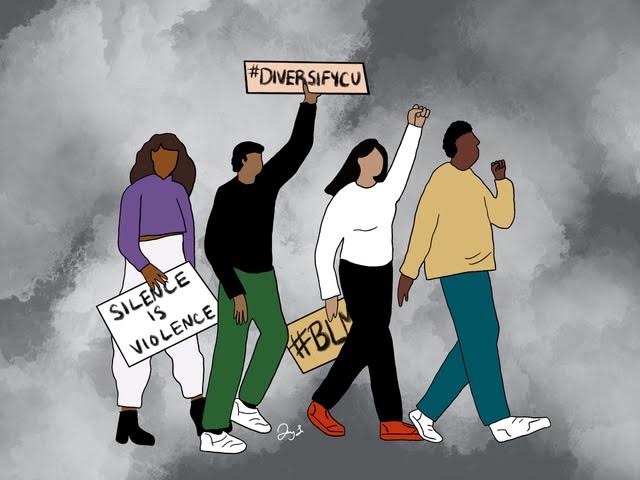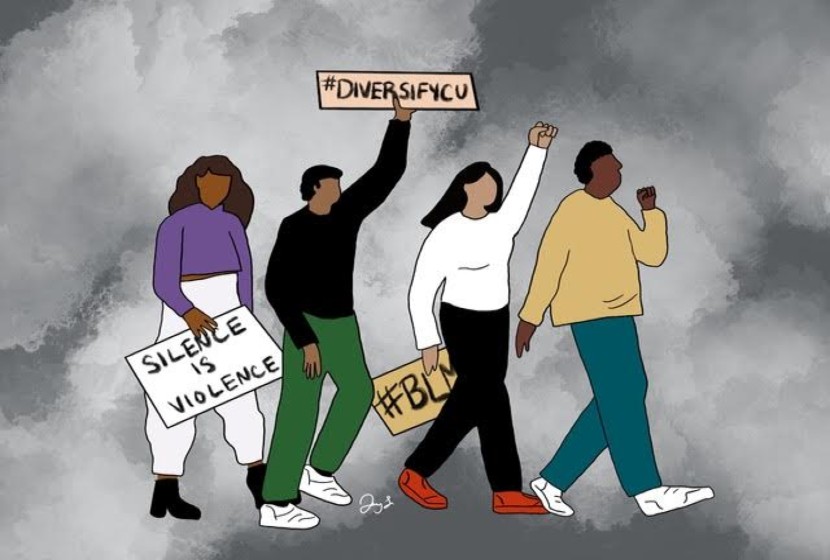

BIPOC Students on Anti-racism
DiversifyCUnow, among other BIPOC student-led organizations, urges the university system to implement anti-racism into academia and campus.
“The rights of our BIPOC, LGBTQ+ and DACA communities to be on our campuses safely and comfortably should not be treated as a political issue,” said DiversifyCUnow leadership.
DiversifyCUnow raised concerns in a press release on August 26, regarding a two-page memo that instructs communication staff on CU’s campuses to submit any statements dealing with “sensitive” topics to the office of President Mark Kennedy prior to publication and avoid partisan language. The memo, originally made in July, was obtained and made public by The Denver Post, on August 25.
Among the many “sensitive” topics is race relations. DiversifyCUnow is concerned this protocol may be an attempt to censor and infringe on their First Amendment rights.
BIPOC students are not only angry, but fearful, due to lack of action regarding anti-racism on campus. “BIPOC students are hurting; they are going to continue to hurt,” said BIPOC graduate and doctoral student-teacher, LeAnna T. Luney. “College is difficult as it is, how can you expect BIPOC students to be students when they are being mistreated everyday?”
It has been over two months since CU Boulder Chancellor, Philip DiStefano, announced he will take immediate actions to implement diversity and inclusion into Boulder’s campus and classrooms. Since this announcement on June 18, no implementations have been announced with the exception of the forming of a council for community and inclusion.
For many students, especially Black, Indigenous, People of Color (BIPOC) students, efforts to push diversity and inclusion have always been at the top of their agenda.
BIPOC Students have voiced their opinions for years encouraging diversity to be implemented into CU Boulder’s daily practices. BIPOC students feel the voices of administration ring hollow. CU graduate student, Juan Ramirez said, “It’s a lot of empty speak. They talk about diversity and inclusion, but they don’t have a thought-out plan in terms of measured objectives.”
The language used by CU Boulder Regents is thought of as repetitive by CU BIPOC students and words that have all been used or said before. “‘Diversity and Inclusion’ looks good on the surface,” said Luney. “In reality, it doesn’t mean much for the people who are most marginalized and it doesn’t mean anything for the people who are asking universities to change.”
Students like Ramirez think the terms “diversity” and “inclusion” shouldn’t be used in the first place and need to be removed from the language when speaking about BIPOC students.
“I find it supremely problematic that the university uses this idea of diversity and inclusion with viewpoint diversity,” said Ramirez. “We need to have various viewpoints, ‘diversity’ and ‘inclusion’ needs to be replaced with ‘anti-racism.’”
In addition to the removal of these buzzwords, the idea of “having the conversation” has become repetitive and students, like Luney, feel unsatisfied from the actionless dialogue. “It’s time to move on; we’ve been having these conversations for years now; people cannot afford to keep having them.What actions are we going to take?” said Luney.
DiversifyCUnow, among other BIPOC student-led organizations, urges the university system to implement anti-racism into academia and campus. This includes up-to-date training for all students, faculty and staff by the spring of 2021. The proposed idea by the students at DiversifyCUnow would be a semester long, one credit course, for all students of all majors. For staff, it would be a 16-week training.
“They need a re-education of what racism in 2020 looks like and what racism in academia looks like,” said lead organizer of DiversifyCUnow, Holly Olivarez. “Racism is not just about finding and pointing fingers at blatant racists. Racism is baked into the structure of the system that runs itself.”
“You can bring all the Black and Brown people you want on campus,” said Luney. “That’s not going to change the structure.”
Olivarez is fearful of others continuing on with their daily lives because they feel words are enough and perceive them as satisfactory. “The leadership touts themselves as champions of their diversity and inclusion efforts,” said Olivarez. “They say all the right things when they have to report to their superiors.” She claims leadership at CU is simply performative.
“Overall, DiStefano and the Regents lack creativity,” said Ramirez. “They are stuck in a mindset that has been completely entrenched by the system; most of them have never experienced the harm that BIPOC students have.”
Because of the rise in the Black Lives Matter movement and the pandemic exposing prevalent racial injustices, CU Boulder is urged to make necessary change.
“I will caution CU leaders to treat this time differently, though…this is 2020, and the impossible is possible,” said Olivarez. “We are creating change with or without campus leadership because we know it is up to us to do this work. We are ready for it.”
Click here for “An Anti-Racist CU, CU Anti-Racism Creed, & Action Plan.” https://www.colorado.edu/ethnicstudies/2020/07/27/anti-racist-cu-cu-anti-racism-creed-action-plan.
Click here for the Denver Post article regarding the memo. https://www.denverpost.com/2020/08/25/cu-free-speech-race-covid-university-of-colorado-sensitive-topics/?utm_medium=social&utm_source=facebook.com&utm_campaign=socialflow&utm_content=fb-denverpost&fbclid=IwAR0dt3lAav50FYeRLx5bNBINssHzuBorbaK-I–4-Z4pEeJw2OZVP_ZH8Ug
BIPOC Student Population
- Minority Student Groups
- White Students
Minority Student Population
-
Asian
-
Native Hawaiian/Pacific
-
Black/African american
-
Hispanic/Latino
-
American Indian/Alaska
-
More than one race
-
International
-
Islander Native

